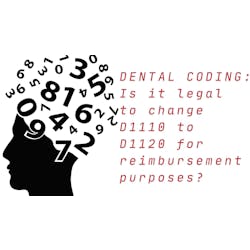Dear RDH:
As one who has participated in scientific and clinical research into the causes and remedies for halitosis for several years, I was very interested in Dr. Strassler`s article about halitosis in your April 1996 issue.
While most of the points made in the article are factually correct, I was disappointed to see that the article included a repetition of many of the old myths about bad breath that have pervaded the medical and dental literature for decades. Based upon my knowledge of the scientific data and my experience in treating thousands of patients for bad breath, I would like to offer the following:
- While many diseases and localized airway infections can produce breath malodor, these conditions are almost always accompanied by other obvious and more urgent symptoms. As a practical matter, patients presenting in dental offices with complaints of bad breath almost never have medical causes for their halitosis.
- In patients presenting with verifiable, chief complaints of chronic bad breath, the odor virtually always originates from the dorso-posterior surface of the tongue where volatile sulfur compounds (foul-smelling gases) are generated by bacterial degradation of proteins (putrefaction). There is no evidence that malodor of the breath originates directly from around the teeth.
- Poor dental (including periodontal) health is not well correlated with halitosis among patients seeking treatment for bad breath.
- At least 50 percent of patients presenting with a chief complaint of bad breath have a significantly exaggerated perception of the intensity of their breath odor problem. Many have no bad breath at all.
- Antibacterial mouthwashes have little effect on breath malodor unless their use is accompanied by mechanical cleaning of the dorso-posterior surface of the tongue. Mouthwashes on their own do not penetrate into the depths of the tongue coating where the bacteria generate the odor. The statement that a mouthwash "kills the germs that cause bad breath" is meaningless if the mouthwash never contacts "the germs that cause bad breath" in the mouth.
- Self-assessment of one`s own breath for malodor is extremely unreliable if not altogether impossible. The best method to determine if one`s breath is offensive is to have someone else smell it.
Dentistry is beginning to embrace the concept of professional management of halitosis in which dental hygienists can play a major role. Standards for the professional management of halitosis are evolving. As we work our way toward a recognized standard of care for halitosis sufferers, we should be guided by scientific evidence rather than the old myths that have impeded progress in this area for so long.
Jon L. Richter, DMD, PhD
Philadelphia, Pennsylvania
Editor`s Note: We invited Dr. Strassler to respond to Dr. Richter`s letter. Dr. Strassler writes: "I would like to thank Dr. Richter for his letter and comments. My article was based, not upon old myths about bad breath, but articles in the past four years that have been published in the scientific literature. I agree that treatment of bad breath is evolving.
"Tongue brushing is becoming more popular and is highly effective in controlling many cases of bad breath. Although Dr. Richter states the `odor virtually always originates from the dorso-posterior surface of the tongue,` other dental research articles have demonstrated other sources of bad breath intraorally or exacerbation of bad breath from the tongue associated with periodontal disease. Reductions in mouth odor have been found after more frequent use of dental floss.
"The most current article on bad breath by Dr. Mel Rosenberg was published in the April 1996 issue of the Journal of the American Dental Association. Dr. Rosenberg pointed out in his article that the xerostomic patient (dry mouth), will have more frequent problems with bad breath. He recommended more frequent drinking of water during the day as being helpful in reducing bad breath. Even with excellent oral hygiene, some patients still have bad breath. In these instances, Dr. Rosenberg recommends the use of rinsing and gargling with effective mouthwashes. I refer the readers to Dr. Rosenberg`s article."





